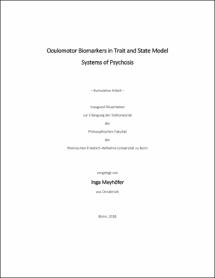Oculomotor Biomarkers in Trait and State ModelSystems of Psychosis

Oculomotor Biomarkers in Trait and State Model
Systems of Psychosis

| dc.contributor.advisor | Ettinger, Ulrich | |
| dc.contributor.author | Meyhöfer, Inga | |
| dc.date.accessioned | 2020-04-24T18:59:51Z | |
| dc.date.available | 2020-04-24T18:59:51Z | |
| dc.date.issued | 21.02.2018 | |
| dc.identifier.uri | https://hdl.handle.net/20.500.11811/7436 | |
| dc.description.abstract | Antipsychotic drugs are highly effective in reducing positive symptoms of psychosis. However, despite major efforts, negative and cognitive symptoms are still not sufficiently treatable. Importantly, these symptoms have been found to be strongly related to psychosocial functioning, thus emphasizing the urgent requirement of new treatments. Model systems are one approach to investigate underlying mechanisms of psychosis and aid the development of new treatments. In this thesis, I investigated the validity of schizotypy, a multidimensional attribute that in-cludes positive, negative, and disorganized traits, and of sleep deprivation as model systems of psychosis. Furthermore, I combined the two models to evaluate potential interactions between them. In order to validate cognitive performance alterations in schizotypy and after sleep deprivation, I applied widely studied oculomotor biomarkers of psychosis (i.e. smooth pursuit eye movements and antisaccades). To evaluate the usefulness of oculomotor bi-omarkers as time stable cognitive patterns, I additionally conducted a study on the trait-like nature of saccadic tasks. The first part of the thesis deals with the research background of psychotic disorders, the foundation of schizotypy and sleep deprivation as valuable model systems, and an introduction to widely studied oculomotor biomarkers of psychosis. The following chapter is a description with introductory information about the methods that I have deployed in the empirical studies. These methods include the recording and analysis of eye movements, latent state-trait modeling, and functional magnetic resonance imaging. Following the presentation of the main findings of the empirical studies, the thesis closes with an integration of the results in the present research literature and with indications to limitations of the studies and ideas for future research. | en |
| dc.language.iso | eng | |
| dc.rights | In Copyright | |
| dc.rights.uri | http://rightsstatements.org/vocab/InC/1.0/ | |
| dc.subject | Glatte Augenfolgebewegungen | |
| dc.subject | Sakkaden | |
| dc.subject | Schizotypie | |
| dc.subject | Schlafentzug | |
| dc.subject | Schizophrenie | |
| dc.subject | Kognition | |
| dc.subject | smooth pursuit | |
| dc.subject | saccade | |
| dc.subject | schizotypy | |
| dc.subject | sleep deprivation | |
| dc.subject | schizophrenia | |
| dc.subject | cognition | |
| dc.subject.ddc | 150 Psychologie | |
| dc.title | Oculomotor Biomarkers in Trait and State Model | |
| dc.title.alternative | Systems of Psychosis | |
| dc.type | Dissertation oder Habilitation | |
| dc.publisher.name | Universitäts- und Landesbibliothek Bonn | |
| dc.publisher.location | Bonn | |
| dc.rights.accessRights | openAccess | |
| dc.identifier.urn | https://nbn-resolving.org/urn:nbn:de:hbz:5-49934 | |
| ulbbn.pubtype | Erstveröffentlichung | |
| ulbbnediss.affiliation.name | Rheinische Friedrich-Wilhelms-Universität Bonn | |
| ulbbnediss.affiliation.location | Bonn | |
| ulbbnediss.thesis.level | Dissertation | |
| ulbbnediss.dissID | 4993 | |
| ulbbnediss.date.accepted | 23.01.2018 | |
| ulbbnediss.institute | Philosophische Fakultät : Institut für Psychologie | |
| ulbbnediss.fakultaet | Philosophische Fakultät | |
| dc.contributor.coReferee | Lencer, Rebekka |
Dateien zu dieser Ressource
Das Dokument erscheint in:
-
E-Dissertationen (713)




